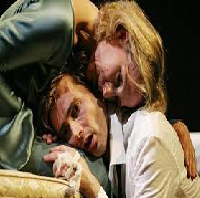Shakespeare Hamlet and Sophocles Oedipus Tyrannous Examine the attitude towards women in Shakespeares Hamlet and Sophocles Oedipus Tyrannus Order Instructions: Additional scholarly research is essential for this assessment.

You must successfully integrate into your discussion at least 2 secondary critical sources to pass. One of these critical sources must originate from the Norton Critical Editions (if you use Hamlet and/or Oedipus Tyrannus to answer a question) or from the archival repository, JSTOR. The second source may come from any appropriate academic book or journal article of your choice. Non-scholarly sources are not permitted for this task.
To do well in this assessment, you will need to demonstrate critical engagement with, and close reading of the primary texts, and an awareness of the key themes of the unit. You also need to use appropriate textual evidence, integrate relevant quotes from the texts and secondary critical readings, and demonstrate a solid command of the academic standards of writing, referencing, and presentation.
In case of emergency, contact via email
Shakespeare Hamlet and Sophocles Oedipus Tyrannous Sample Answer
Examine the attitude towards women in
Shakespeare’s Hamlet and Sophocles’ Oedipus Tyrannus
In the play Hamlet, women are represented as inferior compared with their male counterparts, owing to the perspective that they have no agency or voice. These expectations are particularly expressed in the roles and positions of women as depicted by the fact that Polonius’ daughter, Ophelia, has to heed to his father’s advice against Hamlet. She has to stop meeting and to ignore Hamlet’s letters as ordered by the father. She actually has no power whatsoever to follow her wishes and instead has to do what she is instructed to do. In this statement, women are depicted as weak and needing protection from their superior counterparts; the men (Cox, 2011). In this case, Ophelia conforms to the common idea of women having no agency as she has been taught and as expected by society.
Oedipus’ concern for the future outcome of his daughters in the shadow of his downfall equally proves the position of women; in the shadow of men. This obviously proves that the daughters, as women have to live under their father’s shadow. The downfall of the father has a devastating impact on the way the daughters will fair in society and how people view them. Men were seen as always having the upper hand in terms of decision making whereby in the play hamlet allow men to be holders of higher positions in the society (Kuiper, 2013). In contrast, women are viewed as weak, unappreciated, having to live under the men’s shadows. In both cases, women are portrayed as the weaker sex and needing men for support and direction. They are depicted in a manner to suggest that it would be hard for them to survive without the guidance and protection of men.
Shakespeare Hamlet and Sophocles Oedipus Tyrannous References
Cox, M. (2011). Hamlet, William Shakespeare. Deddington: Philip Allan Updates.
Kuiper, K. (2013). The History Plays and Poems of William Shakespeare. New York: Britannica Educational Pub.




